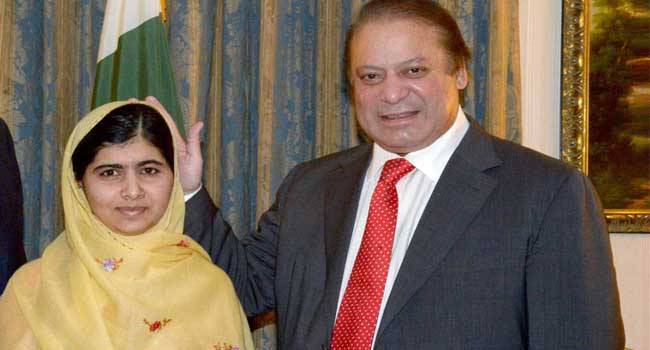At the Oslo World Education Summit attended by the UN Secretary General and amongst others by Malala, Gordon Brown, Executive Director of UNICEF and Prime Minister of Pakistan Nawaz Sharif. Malala, Nobel Peace Laureate, urged the world leaders to cut “eight days of military spending”. That will “suffice to give all children access to 12 years of free education”.
Our Prime Minister also spoke and waxed eloquent saying that Pakistan was giving high priority to education and there are plans to raise spending in the sector to 4% of GDP.
This is exactly what he said almost two years ago when Gordon Brown, UN Secretary General’s Special Envoy on Education, visited Pakistan and assured UN funding for enrolling out-of-school children in primary schools. Then the Prime minister had promised that allocation for education would be raised to 4% of GDP with a caveat that it would be done by the year 2018—the last year of his government. Allocations remain around 2% with the actual spent amount rolling between 1.6 to 1.8 percent.
How is it that the worthy Prime Minister speaks eloquently about education only during events organized by UN and other international agencies or on such occasions as the International Literacy Day?!
Although the Punjab and KPK, especially the former, have considerably raised funds earmarked for education (more than 25% of the budget) allocations and efforts for improvement in the quality of teaching and learning remain inadequate and unsatisfactory.
The most neglected in Pakistan are the adult illiterates numbering about 60 million.
A full-fledged Literacy Department was setup in the Punjab with Executive Education Officers in each district. A few years back the post of the EDO Literacy was abolished and responsibility for literacy too, entrusted to EDOs Education who are already overburdened. Again the central as well as provincial governments have neglected its obligation to implement the EFA National Plan with the result that Pakistan has today the dubious distinction of one of the countries which will fail to attain 5 of the 6 goals set at Dakar in the year 2000 by the end of 2015.
Most of the world has marched ahead and in the September session of the United Nations new (and very ambitions) goals called SDGs (Sustained Development Goals) will be approved to be achieved by 2030.
What a shame that the world average literacy rate is nearing 86% while Pakistan is struggling to reach about 58%. It is disgraceful to learn of ghost schools and ghost teachers in thousands in the province of Sindh. It appears that most of the funds allocated in the budget for literacy in that province are eaten up by political and administrative functionaries. The number of adult literacy centres in Sindh and Balochistan is a fraction of the figure set in the National Plan of Action.
So Mr. Prime Minister, it is alright for you to talk about your government’s plan to step up the quality of education but could you on return hold, for a change, just one meeting to find out why one third of the population of the country cannot read and write and what this means for the society, economy and the polity. The fact of the matter is that most of our ruling elite is not interested in spreading literacy.
The prevalent feudal culture besides spawning others ills and evils, has generated an anti-literacy virus.
If one were to look at the website of the UNESCO Islamabad Office, one is surprised to see how lethargic it too has become to promote literacy in Pakistan. And this despite the Director General UNESCO issuing a special directive (Paris Communiqué 2012) to the country offices to make special efforts to goad the governments, to speed up the process of spreading literacy for the realization of the ‘Education For All’ goals and targets.
For the education of our ruling elite and to refresh the minds of the UNESCO Islamabad office-bearers, let me give below excerpts from the UNESCO document titled: Why Literacy Matters and the 2012 Paris Communiqué.
Excerpts from UNESCO’s statement on: Why Literacy Matters:
Literacy is a right. It is implicit in the right to education. It is recognised as a right, explicitly for both children and adults, in certain international conventions.The 1948 Universal Declaration of Human Rights recognises the right to education, as do other binding international conventions. The rationale for recognizing literacy as a right is the set of benefits it confers on individuals, families, communities and nations. Indeed, it is widely reckoned that, in modern societies, ‘literacy skills are fundamental to informed decision-making, personal empowerment, active and passive participation in local and global social community’ (Stromquist, 2005, p. 12).
Effects of literacy on leisure time and privacy in Pakistan:
Once women in Pakistan are able to read and write in Urdu (the national language) and in English, the quality of their leisure time changes and they cre-ate a new norm of privacy, according to studies of two different rural communities.
Younger women create private time when they can read news, romantic fiction and women’s magazines, and write diaries. Reading and writing do not remain mere leisure activities but become means of creat- ing private space, freeing imagination, and engaging in reflection and emotional expression. Through leisure reading and writing, women begin to ques- tion, challenge, resist and renegotiate values and their own roles.
Excerpts from Paris Communiqué 2012:
Recognising that literacy is a right and an instrument for achieving equitable and inclusive societies, social justice and individual freedoms, and an accelerator of shared growth and sustainable development, we felt that this cornerstone of development needs further strengthening.
We encourage UNESCO to provide assistance in support of national efforts through existing and new initiatives and to facilitate mobilisation of further resources through innovative partnerships.






